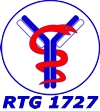TP8: Regulation of the inflammatory response in Goodpasture-Syndrom through complement- and IgG-receptors
Immune complexes play an important role in the pathogenesis of many autoimmune diseases. An important immune complex (IC)-driven autoimmune disease is the anti-glomerular basement membrane (GBM) nephritis, which is characterized by autoantibodies against the 3 chain of type IV collagen. When such antibodies form IC at the glomerular and alveolar basement membranes, the Goodpasture-Syndrome can develop. To experimentally model Goodpasture-Syndrome, we use an active model of anti-GBM nephritis. It is well appreciated that IgG Fc receptors and the adaptive immune system play important roles in disease pathogenesis. However, the contribution of the complement system is less clear and requires further research. This project is designed to assess the role of C5a in a mouse model of anti-GBM nephritis. For this purpose, we will pharmacologically target the two C5a receptors CD88 and C5L2 using the C5aR/C5L2 double inhibitor A8D71-73. Further we will use several complement knock out mice. As readouts we will determine the survival rates, complement and immune complex deposition in the kidney by immunohistochemistry. Further we will monitor development of disease-specific IgG and blood urea nitrogen levels in the circulation. To assess the mechanisms underlying the disease we will use methods including flow cytometry, ELISA, confocal microscopy and real time RT-PCR. Our aim is to delineate the role of C5a in the pathogenesis of anti-GBM nephritis and to assess its potential as a new therapeutic target.

- Projects
- Projects
- Associated projects
- MD projects
- Associated MD projects
- Concluded projects
- Concluded TP
- TP1 - Modulation of isotypes
- TP2 - Targeted fusion proteins
- TP3 - Selective FcRn inhibition
- TP4 - IL-35, Treg and EAE
- TP5 - Apoptotic cells
- TP6 - Mast cell / T cell interactions
- TP7 - Fc gamma receptors
- TP8 - IgG- and C-receptors
- TP9 - IVIG
- TP10 - HMGB1 Protein
- TP11 - IL15 / IL15Rα
- TP12 - S100 proteins
- TP13 - Treatment-refractory B cells
- TP A1 - Treatment strategies
- TP A2 - B cell inhibition
- TP A3 - IL-17 in EBA
- TP A4 - The pathophysiological role of Th17cells in Bullous pemphigoid
- TP A5 - C5a/C5aR
- TP A6 - Signals leading to glycosylated antibodies
- TP A7 - IL-16 & MIF in autoimmunity
- TP B1 - B cell transcriptome
- TP B2 - Antigen-specific T cells
- TP B3 - Metabolomics
- TP B4 - Resident plasma cells
- TP B5 - Anti-CD37 antibodies
- TP B6 - Systemic Sclerosis
- Concluded Ass.TP
- Concluded MD TP
- Concluded Ass. MD TP
- Concluded TP





